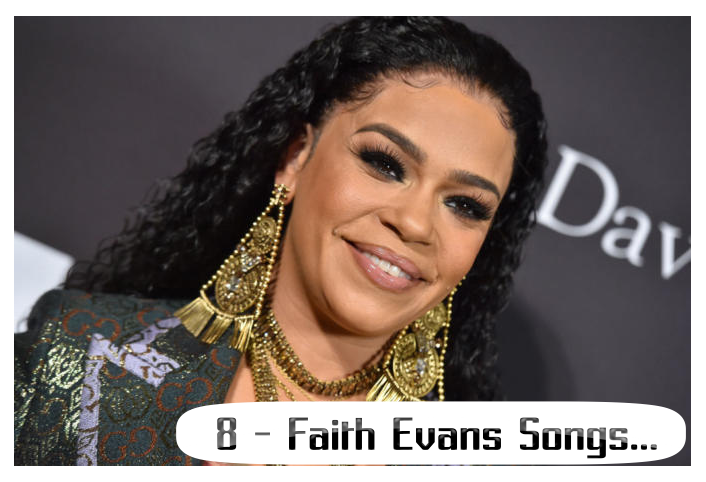(ThyBlackMan.com) Faith Evans has always been one of those R&B artists who could balance gospel-rooted vocals with contemporary grooves and heartfelt storytelling. From the mid-1990s onward, she carved a lane as one of the most dependable vocalists in urban music. Her songs are the kind that hold weight years later—timeless ballads, heartfelt tributes, and club-ready jams that remain relevant no matter the decade. Whether you discovered her through her collaborations with The Notorious B.I.G., her own solo classics, or her later Grammy-winning projects, Evans has a catalog worth revisiting.
Below, we’ll break down eight Faith Evans songs that showcase her artistry and explain how each one can still be enjoyed today.

1. “Soon as I Get Home”
Beyond being a tender love ballad, “Soon as I Get Home” also represented a bold move for Faith Evans’ career. At a time when R&B was often dominated by either powerhouse vocal theatrics or flashy hip-hop-infused grooves, she chose restraint. Her performance here is soulful but understated, proving that subtle emotion can carry just as much weight as vocal fireworks. That decision helped her stand out among her contemporaries and gave listeners a different palette of R&B to enjoy.
Lyrically, the song taps into something deeply relatable—the promise to make amends and be present after a period of absence. Many working-class fans identified with it because it mirrored their real-life experiences of being away from loved ones due to work or personal struggles. It wasn’t just a “love song” in the abstract; it spoke to a reality that resonated across age and class. Faith’s ability to capture that reality without being overly dramatic is part of what makes it timeless.
The instrumentation deserves attention as well. The warm synths and light percussion never overpower her vocals. Instead, they act as a cushion, supporting the vulnerability of her delivery. Producer Chucky Thompson allowed space for her voice to dominate, which turned out to be the right choice. The sparseness makes the track more intimate, almost as if she’s sitting across from you singing directly to your situation.
Listening now, “Soon as I Get Home” feels like both a time capsule and a living, breathing statement on love’s durability. It still works as a late-night ballad, but it also feels like a template for later artists who wanted to blend raw honesty with polished production. You can hear echoes of it in the works of artists like Alicia Keys and Jazmine Sullivan—women who balance vulnerability with strength. Faith’s ballad remains a quiet masterpiece, proof that R&B doesn’t always need excess to make its point.
2. “Love Like This”
What makes “Love Like This” so brilliant is its ability to combine nostalgia with forward motion. The Chic sample immediately pulled in older listeners who recognized the disco groove, but Faith’s vocal delivery and lyrical content kept it fresh for a younger audience. This dual appeal is why the song transcended generations and remains one of her most iconic hits. It’s a perfect example of how sampling, when done with care, can create a bridge between musical eras.
Thematically, the track is about the overwhelming joy of finding a love that feels brand new, and Faith conveys that feeling effortlessly. She doesn’t just sing the words—she lives them. The playfulness in her phrasing, the sparkle in her tone, all contribute to the sense that she is genuinely swept up in love. That authenticity is why the track hasn’t aged. It’s hard to resist the sincerity of someone truly celebrating love.
In terms of cultural impact, “Love Like This” became more than a song—it became a soundtrack to celebrations. From birthday parties to weddings, the track has lived on as a staple of joyful gatherings. Its later reincarnation through Fatman Scoop’s “Be Faithful” gave it a second life in hip-hop and club culture, proving the original groove was strong enough to be reimagined without losing its essence.
Today, when R&B sometimes leans heavily into moody, introspective vibes, “Love Like This” is a refreshing reminder of the genre’s capacity for euphoria. It’s a song that encourages listeners not just to feel love but to celebrate it with movement. Evans proved that love songs didn’t need to be quiet or reserved—they could be loud, funky, and unapologetically happy. That lesson continues to echo in the work of artists who aim to capture joy in their music.
3. “You Used to Love Me”
“You Used to Love Me” wasn’t just a debut single; it was a declaration. Faith Evans entered the R&B world with a song that showed her emotional maturity and willingness to confront uncomfortable truths. Instead of introducing herself with a glamorous dance track, she gave the world a mid-tempo ballad about fading love—a theme that requires vulnerability and courage. That choice set her apart immediately.
The brilliance of the track lies in its balance of strength and fragility. Faith doesn’t beg or plead; she simply states her reality with clarity and sadness. That refusal to overdramatize is part of what makes the song feel authentic. Many listeners connected because it reflected the quiet devastation of realizing someone’s feelings have changed. That kind of understated heartbreak hadn’t always been centered in mainstream R&B, and Evans made it her entry point.
Musically, the song fit within the Bad Boy sound of the time but carried its own distinct weight. The beat was steady, almost hypnotic, and the instrumentation allowed Faith’s voice to be the true focal point. The slight rasp in her delivery added grit, while her gospel background shone through in her phrasing. This combination of polish and rawness made the song unforgettable.
Even now, “You Used to Love Me” resonates as a universal story of heartbreak. It’s not tied to a particular era’s slang or trends, which helps it endure. The emotional truth it conveys is evergreen: the pain of lost affection. Faith’s decision to make this her first single was a masterstroke, cementing her as an artist willing to give audiences the truth rather than just glossy entertainment. It remains one of her most defining moments.
4. “I Love You”
“I Love You” is one of those ballads that grows in meaning the older you get. At first listen, it sounds like a straightforward love song, but on closer inspection, it’s full of contradictions and complexity. It’s not about an easy, fairytale romance—it’s about the turbulence of love that is deeply felt but also deeply complicated. Faith Evans’ ability to capture that contradiction in her vocal delivery is what makes this track enduring.
Her performance is full of little imperfections that add to the song’s honesty. The slight cracks in her voice, the moments where she almost sounds on the verge of tears—all of it builds a sense of realism. Instead of presenting love as neat and polished, she gives listeners the messy, painful version. This level of emotional transparency has always been one of Evans’ strongest traits, and it’s why the song continues to resonate.
The orchestral production enhances the song’s cinematic quality. Strings swell dramatically, the piano anchors the melody, and the percussion remains minimal, ensuring that her voice is always at the center. The arrangement feels almost like a film score, elevating the story to something larger than life. Yet at the same time, her delivery grounds it in raw humanity. This contrast is what makes the song feel so powerful.
“I Love You” works in multiple contexts even now. For some, it’s a song to cry to, a soundtrack for heartbreak. For others, it’s a song to reflect on the beauty and pain of love simultaneously. Its adaptability is what makes it timeless. Faith Evans took a song that could have been formulaic and transformed it into something emotionally layered. It’s one of her greatest vocal showcases, and a reminder of how she elevated R&B balladry with sincerity and depth.
5. “Again”
“Again” was not just a comeback single; it was Faith Evans standing in her truth. Coming off years of personal turbulence and navigating life in the public eye as Biggie’s widow, Evans chose to face the world head-on. Rather than bury her past, she sang about it. The record is autobiographical, with lines that acknowledge her missteps and legal troubles, but instead of wallowing, she flips the narrative into triumph. That courage—to turn scandal into song—is what made “Again” such a standout moment.
The upbeat groove, fueled by The Staple Singers’ “Let’s Do It Again” sample, provides a striking contrast to the seriousness of the subject matter. It’s almost as if Evans wanted to show that life’s lessons don’t have to sound depressing—they can be empowering. The arrangement gives her the space to deliver a performance that is simultaneously reflective and celebratory. Her tone carries pride, a sense of “I made it through,” which listeners quickly connected with.
Culturally, the track showed that Faith was more than a singer tied to Biggie’s legacy. She was her own woman, her own artist, unafraid to embrace the imperfections of her story. Fans praised the honesty, because it broke through the glossy façade that many artists maintain. It’s not easy to admit your struggles in front of millions, but Evans did it with a blend of humility and confidence that only added to her credibility.
Even today, “Again” resonates as a survival anthem. It’s for anyone who has stumbled but found the strength to get back up. The track sits comfortably in playlists about resilience, motivation, and rebirth. Its message—that setbacks don’t define you, but comebacks do—continues to give it staying power. Faith turned her personal trials into a universal celebration of perseverance, and that makes “Again” one of her most important artistic statements.
6. “Never Gonna Let You Go”
“Never Gonna Let You Go” reflects Faith Evans at her most spiritually anchored. From the first notes, you hear a song that straddles the line between secular love ballad and devotional hymn. It’s a love song directed toward a partner, but the sincerity of Evans’ performance gives it an almost gospel-like quality, as if she’s singing about something eternal, something bigger than human love alone. That spiritual undertone is one of the qualities that makes it so unique.
The production on the track is lush but never overwhelming. The piano chords set a warm foundation, while layered harmonies give the chorus a choir-like grandeur. Evans’ lead vocal soars above it all, controlled yet passionate. There’s an honesty in her voice that makes you believe the depth of her devotion, and that honesty is the key to the song’s impact. While not as commercially successful as some of her singles, it has become a quiet favorite among dedicated fans who understand its emotional richness.
What makes the song timeless is its focus on loyalty and commitment—values that never lose relevance. In an age where fleeting relationships and “situationships” often dominate conversation, “Never Gonna Let You Go” re-centers love as something worth holding on to. Evans doesn’t present devotion as boring or obligatory; she presents it as beautiful, even sacred. That framing gives the song a power that transcends trends.
For listeners today, the track shines in intimate settings. It’s the kind of song you play during a quiet night with your partner, or when you need to be reminded of the beauty of devotion. It elevates ordinary moments into something profound. Faith’s ability to make such a deeply personal performance feel universally relatable is exactly why “Never Gonna Let You Go” has endured.
7. “I’ll Be Missing You”
Few songs in Faith Evans’ career—and in R&B history—carry the cultural weight of “I’ll Be Missing You.” Released in the aftermath of The Notorious B.I.G.’s murder, the track became an anthem of grief, healing, and unity. Built on The Police’s “Every Breath You Take,” the record could have risked being seen as gimmicky, but Evans’ heartfelt chorus elevated it into something timeless. Her voice became the emotional anchor that turned a hip-hop tribute into a global statement.
Faith’s chorus is where the song lives. Her delivery carries both devastation and resilience, expressing a grief that millions shared but few could articulate. You can hear the heartbreak in her tone, but also the strength of someone trying to keep going. That duality made the track powerful for fans and casual listeners alike. Without her, the song would have been incomplete; with her, it became transcendent.
The song’s cultural impact cannot be overstated. It topped charts worldwide, won a Grammy, and played everywhere from radio stations to memorial services. More importantly, it showed the healing power of music. For a hip-hop community fractured by loss, Evans’ performance brought people together, offering comfort in the middle of tragedy. Her voice was not just a personal lament—it became a collective mourning.
Even today, “I’ll Be Missing You” is still played at memorials and tributes. Its message has outlasted its moment, proving that grief is universal and music can help us carry it. For Evans, it cemented her place in history, not just as an R&B singer but as a voice of comfort and strength in one of hip-hop’s darkest hours. It remains a defining moment in her career, one that turned personal pain into something eternal.
8. “Kissing You”
“Kissing You” may not have been a chart-topping single, but it is easily one of Faith Evans’ most delicate and moving performances. Featured on the Waiting to Exhale soundtrack, the song was surrounded by powerhouse ballads from icons like Whitney Houston and Toni Braxton. Yet Evans carved out her own space with a track that emphasized intimacy and subtlety over vocal fireworks. The result was a performance that still feels breathtaking in its restraint.
The production is sparse, built around soft piano chords and light instrumentation, which allows Faith’s voice to carry the weight of the song. Her delivery is tender, full of longing, but never overdone. She captures the sweetness of a first kiss, the innocence of early love, and the vulnerability of opening your heart. It’s a song that whispers rather than shouts, and that whisper lingers long after the track ends.
“Kissing You” represents a different side of Faith Evans—the side that could hold her own on a soundtrack filled with R&B giants by leaning into subtlety rather than trying to out-sing anyone. That decision showcased her versatility and maturity as an artist. She didn’t need to prove vocal power; she needed to convey emotion, and she did so flawlessly.
For today’s listeners, “Kissing You” is the kind of track that fits perfectly in intimate settings. It works for slow dances, candlelit evenings, or even solitary reflection. Its emotional core is timeless—love in its most tender form. This song remains a reminder of how Evans could take a simple melody and turn it into something profound, securing her place as one of R&B’s most soulful interpreters.
Faith Evans’ career is a testament to the power of sincerity in music. Her songs have always carried an emotional clarity—whether celebrating joy, enduring heartbreak, or processing grief. What ties these eight tracks together is their timelessness. Each one can still be played today and resonate just as strongly as it did upon release.
From the dance-floor brilliance of “Love Like This” to the heart-wrenching intimacy of “Kissing You,” Evans has proven herself as an artist who could thrive in every emotional register. These songs remind us why Faith Evans remains one of the most respected voices in R&B—an artist who knew how to turn real life into music that still matters.
















Leave a Reply